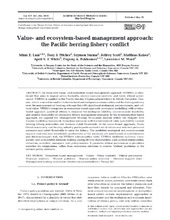| dc.contributor.author | Lam, Mimi Elizabeth | |
| dc.contributor.author | Pitcher, Tony J. | |
| dc.contributor.author | Surma, Szymon | |
| dc.contributor.author | Scott, Jeffery | |
| dc.contributor.author | Kaiser, Matthias | |
| dc.contributor.author | White, April SJ | |
| dc.contributor.author | Pakhomov, Evgeny A | |
| dc.contributor.author | Ward, Lawrence M | |
| dc.date.accessioned | 2020-04-08T08:26:15Z | |
| dc.date.available | 2020-04-08T08:26:15Z | |
| dc.date.issued | 2019 | |
| dc.Published | Lam ME, Pitcher TJ, Surma S, Scott J, Kaiser M, White, Pakhomov EA, Ward. Value- And ecosystem-based management approach- And Pacific herring fishery conflict. Marine Ecology Progress Series. 2019;617-618:341-364 | eng |
| dc.identifier.issn | 0171-8630 | |
| dc.identifier.issn | 1616-1599 | |
| dc.identifier.uri | https://hdl.handle.net/1956/21815 | |
| dc.description.abstract | We introduce an innovative value- and ecosystem-based management approach (VEBMA) that exposes resource policy tradeoffs, fosters good governance, and can help to resolve conflicts. We apply VEBMA to the Pacific herring Clupea pallasii fishery in British Columbia, Canada, which is mired in conflict between local and indigenous communities and the fishing industry over the management of herring, a forage fish with significant socioeconomic, ecological, and cultural value. VEBMA integrates an ecosystem-based approach (ecological modelling) with a value-based approach (practical ethics) to examine the ecological viability, economic feasibility, and societal desirability of alternative fishery management scenarios. In the ecosystem-based approach, we applied the Management Strategy Evaluation module within the Ecopath with Ecosim modelling framework to explore scenarios with harvest-control rules specified by various herring fishing mortalities and biomass cutoff thresholds. In the value-based approach, Haida Gwaii community and herring industry participants ranked a set of values and selected preferred scenarios and cutoff thresholds. The modelled ecological impacts and risks and stakeholder preferences of the scenarios are synthesized in a deliberation and decision-support tool, the VEBMA science-policy table. VEBMA aims to facilitate inclusive, transparent, and accountable decision-making among diverse stakeholders, such as local communities, industries, scientists, managers, and policy-makers. It promotes compromise, rather than consensus solutions to resolve ‘wicked’ problems at the science-policy interface. | en_US |
| dc.language.iso | eng | eng |
| dc.publisher | Inter-Research | eng |
| dc.rights | Attribution CC BY | eng |
| dc.rights.uri | http://creativecommons.org/licenses/by/4.0 | eng |
| dc.title | Value- And ecosystem-based management approach- And Pacific herring fishery conflict | eng |
| dc.type | Journal article | eng |
| dc.type | Peer reviewed | eng |
| dc.date.updated | 2020-02-10T13:55:22Z | |
| dc.description.version | publishedVersion | |
| dc.rights.holder | Copyright 2019 The Author(s) | eng |
| dc.identifier.doi | https://doi.org/10.3354/meps12972 | |
| dc.identifier.cristin | 1726750 | |
| dc.source.journal | Marine Ecology Progress Series | |

